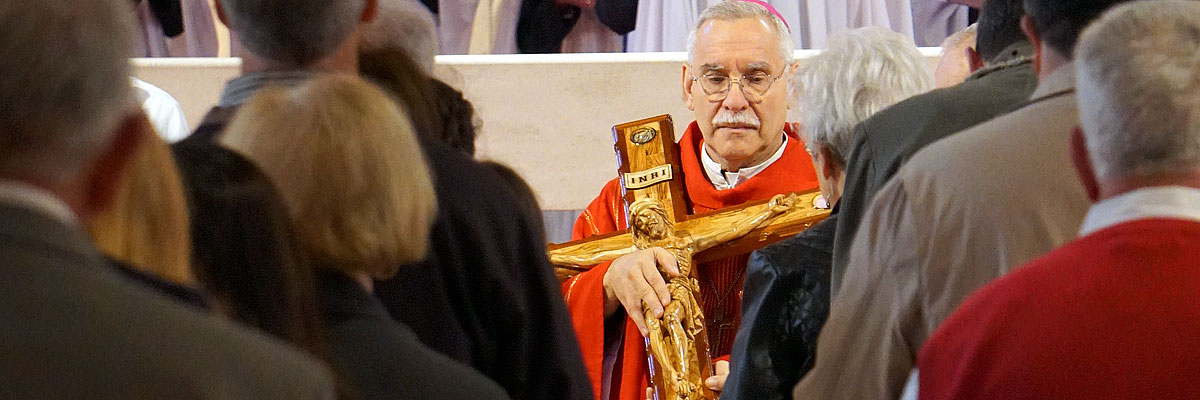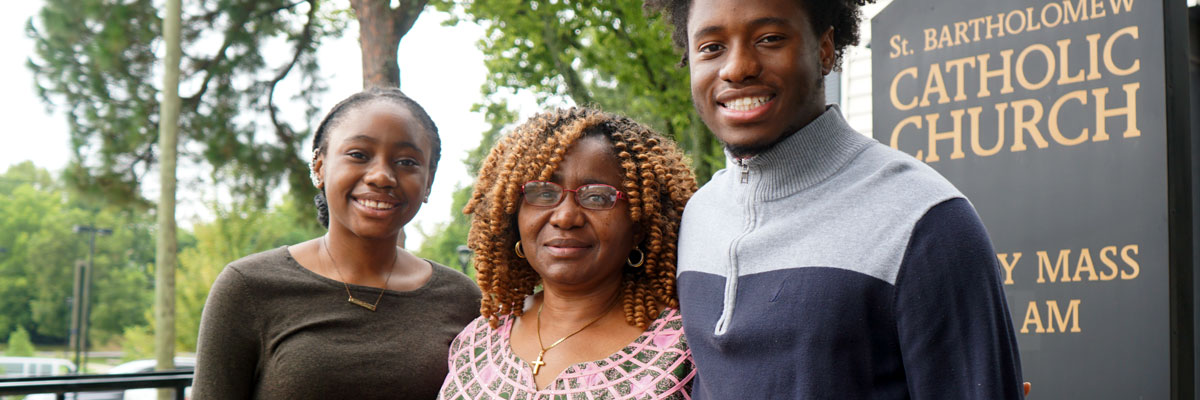Official Website of the
Catholic Diocese of Little Rock
Ruth & Naomi's bond reflects God's love
Published: October 1, 2011
This is the fifth column in a 13-part series
By Cackie Upchurch
Director of Little Rock Scripture Study
Sadly it is rather common in our culture to make jokes about in-laws, particularly one's mother-in-law, and sometimes the relationship between a mother- and daughter-in-law can be contentious. The book of Ruth offers an entirely different perspective on this often maligned relationship. Hopefully the story of Naomi and her daughter-in-law Ruth will hold additional lessons for us as well.
 The story begins and ends in Bethlehem, a small town that in Hebrew means "house of bread." Interestingly, this small town will in later centuries be the birthplace of Jesus, who identifies himself in the Gospel of John, chapter 6, as the "bread of life." In the book of Ruth, however, it is a small town suffering through a famine.
The story begins and ends in Bethlehem, a small town that in Hebrew means "house of bread." Interestingly, this small town will in later centuries be the birthplace of Jesus, who identifies himself in the Gospel of John, chapter 6, as the "bread of life." In the book of Ruth, however, it is a small town suffering through a famine.
In most parts of the ancient world, and many underdeveloped parts of our world today, the only way to survive a famine is to move to a more fertile place if at all possible. Naomi, her husband and her sons did just that when they crossed the Jordan River into Moab (a portion of modern day Jordan). They settled in, their sons even marrying Moabite women, Orpah and Ruth.
After about 10 years, following the deaths of Naomi's husband and sons, news came that Bethlehem was recovering. Naomi set out for a return to Bethlehem, and encouraged her daughters-in-law to return to their families in Moab. Orpah did as Naomi requested, but Ruth instead pledged her life to Naomi in these familiar words (Ruth 1:16-17):
Wherever you go I will go,
wherever you lodge I will lodge.
Your people shall be my people
and your God, my God.
Where you die I will die,
and there be buried.
Some may find it ironic that words so often chosen for the sacrament of marriage originally were a pledge from a daughter-in-law (a foreigner at that) to her former mother-in-law, from one widow to another. But as the story unfolds, these words become a powerful witness to the kind of practical love that is necessary for the physical survival of these two women, and necessary for spiritual health in every age.
In the culture of the ancient Mediterranean region, women were particularly vulnerable, especially without a male relative to serve as a patron. Israel's law included specific but limited protection for widows (Exodus 22:21-22 and Deuteronomy 24:17) probably because they were often neglected. In fact, the writings of the prophets (Isaiah 1:23; 10:2 and Malachi 3:5), indicate that the abuse of widows is a reason for God's displeasure and judgment against Israel.
Necessity demanded that the two women find a way to survive, and Jewish law provided a meager way to eke out an existence (Leviticus 19:9-10 and Deuteronomy 24:19-22). Gleaning was the prescribed practice of allowing those on the fringes of society to comb the fields after the first harvest before the fields were stripped completely bare. Ruth, the younger of the two women, took full advantage of this practice in the fields of Boaz, a distant relative of Naomi.
Ruth's devotion to her mother-in-law, her willingness to do whatever was necessary for survival, and her industry brought Ruth to Boaz's attention. Naomi knew the customs of her people and she used them to help Ruth find a creative way to change the relationship of master and servant to husband and wife. The marriage of Boaz and Ruth not only provided security and protection for both women, but it produced an heir. Ruth's son, Obed, would become King David's grandfather and Ruth would be forever remembered in the genealogy of Jesus (Matthew 1:5).
The relationship between Ruth and Naomi is a reflection of the faithful love of God offered to Israel and to us in the gift of covenant. Their story illustrates the power of mutual commitment between persons. When we choose to surrender to loving another person, we form a relationship that testifies to God's faithfulness and not just our own.
Ruth and Naomi also shared a mutual commitment to survival. Sometimes a great and necessary mission can be the place where we discover our own gifts and in the process discover God's abiding and creative presence with us.
The book of Ruth makes no direct reference to God's covenant with Israel but there is no question that it is told in every generation as a testament to that covenant. Faithful love is an abiding mark of the covenant; few stories capture that lesson better than this one.
Study Questions
- When have family relationships both tested and cemented your mutual bonds?
- Given what you know about the original context for Ruth 1:16-17, how does the familiar refrain take on new meaning as a pledge between married couples?
- What significance do you attach to the element of bread throughout this story?
- When has the gift of a committed friendship helped you discover something about yourself and about God?
This article was originally published in Arkansas Catholic Oct. 1, 2011. Copyright Diocese of Little Rock. All rights reserved. This article may be copied or redistributed with acknowledgement and permission of the publisher.









